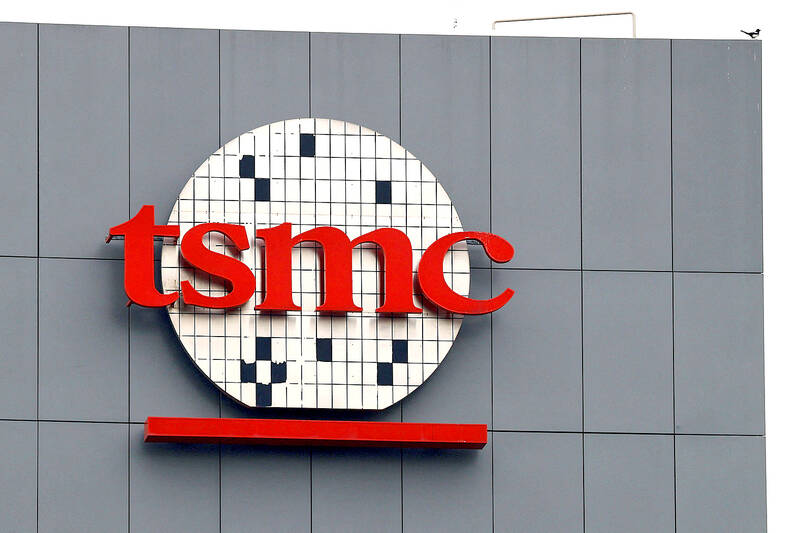Taiwan Semiconductor Manufacturing Co (TSMC, 台積電) has begun producing advanced 4-nanometer (nm) chips for US customers in Arizona, US Secretary of Commerce Gina Raimondo said, a milestone in the semiconductor efforts of the administration of US President Joe Biden.
In November last year, the commerce department finalized a US$6.6 billion grant to TSMC’s US unit for semiconductor production in Phoenix, Arizona.
“For the first time ever in our country’s history, we are making leading edge 4-nanometer chips on American soil, American workers — on par in yield and quality with Taiwan,” Raimondo said, adding that production had begun in recent weeks.

Photo: Reuters
“That’s a big deal — never been done before, never in our history, and lots of people said it couldn’t happen,” Raimondo said of the previously undisclosed production start.
A spokesperson for TSMC, the world’s largest contract chipmaker and a major supplier to Apple and Nvidia, which is to report earnings next week, declined to comment on Friday.
TSMC in April last year agreed to expand its planned investment by US$25 billion to US$65 billion and to add a third Arizona fab by 2030.
COURTING FIRMS
The US Congress created a US$52.7 billion semiconductor manufacturing and research subsidy program in 2022.
All five leading-edge semiconductor firms agreed to locate fabs in the US as part of the program.
Raimondo earlier said that the Department of Commerce had to convince TSMC to boost its US plans.
“It didn’t happen on its own... We had to convince TSMC that they would want to expand,” Raimondo said.
TSMC would produce the world’s most advanced 2-nanometer technology at its second Arizona fab, which is expected to begin production in 2028.
The company also agreed to use its most advanced chip manufacturing technology, called “A16,” in Arizona.
The department has also awarded TSMC up to US$5 billion in low-cost government loans.
Raimondo said she wants the US to make 20 percent of world’s leading-edge logic chips by 2030 — up from none before TSMC began production in Arizona.
In April last year, the department said TSMC expects to begin high-volume production in its first US fab by the first half of this year.
The department last month finalized an award of US$407 million to help fund Amkor Technology’s planned US$2 billion advanced semiconductor packaging facility in Arizona, which is set to be the largest of its kind in the US.
Amkor’s Arizona plant, when fully operational, would package and test millions of chips for autonomous vehicles, 5G/6G and data centers. Apple would be its first and largest customer with the chips produced at a nearby TSMC facility.

MAKING WAVES: China’s maritime militia could become a nontraditional threat in war, clogging up shipping lanes to prevent US or Japanese intervention, a report said About 1,900 Chinese ships flying flags of convenience and fishing vessels that participated in China’s military exercises around Taiwan last month and in January have been listed for monitoring, Coast Guard Administration (CGA) Deputy Director-General Hsieh Ching-chin (謝慶欽) said yesterday. Following amendments to the Commercial Port Act (商港法) and the Law of Ships (船舶法) last month, the CGA can designate possible berthing areas or deny ports of call for vessels suspected of loitering around areas where undersea cables can be accessed, Oceans Affairs Council Minister Kuan Bi-ling (管碧玲) said. The list of suspected ships, originally 300, had risen to about 1,900 as

Japan’s strategic alliance with the US would collapse if Tokyo were to turn away from a conflict in Taiwan, Japanese Prime Minister Sanae Takaichi said yesterday, but distanced herself from previous comments that suggested a possible military response in such an event. Takaichi expressed her latest views on a nationally broadcast TV program late on Monday, where an opposition party leader criticized her for igniting tensions with China with the earlier remarks. Ties between Japan and China have sunk to the worst level in years after Takaichi said in November that a hypothetical Chinese attack on Taiwan could bring about a Japanese

MORE RESPONSIBILITY: Draftees would be expected to fight alongside professional soldiers, likely requiring the transformation of some training brigades into combat units The armed forces are to start incorporating new conscripts into combined arms brigades this year to enhance combat readiness, the Executive Yuan’s latest policy report said. The new policy would affect Taiwanese men entering the military for their compulsory service, which was extended to one year under reforms by then-president Tsai Ing-wen (蔡英文) in 2022. The conscripts would be trained to operate machine guns, uncrewed aerial vehicles, anti-tank guided missile launchers and Stinger air defense systems, the report said, adding that the basic training would be lengthened to eight weeks. After basic training, conscripts would be sorted into infantry battalions that would take

DEEP-STRIKE CAPABILITY: The scenario simulated a PLA drill that turned into an assault on Taiwan’s critical infrastructure, with the launchers providing fire support Taiwan yesterday conducted this year’s first military exercises at Longsiang Base in Taichung, demonstrating the newly acquired High Mobility Artillery Rocket System’s (HIMARS) ability to provide fire support and deep-strike capabilities. The scenario simulated an attack on Penghu County, with HIMARS trucks immediately rolling into designated launch areas and firing barrages at the Wangan (望安) and Cimei (七美) islands, simulating the provision of fire support against invading forces. The HIMARS are supposed to “fire and leave,” which would significantly increase personnel and equipment survivability, a military official said. The drill simulated an exercise launched by the Chinese People’s Liberation Army (PLA) Eastern